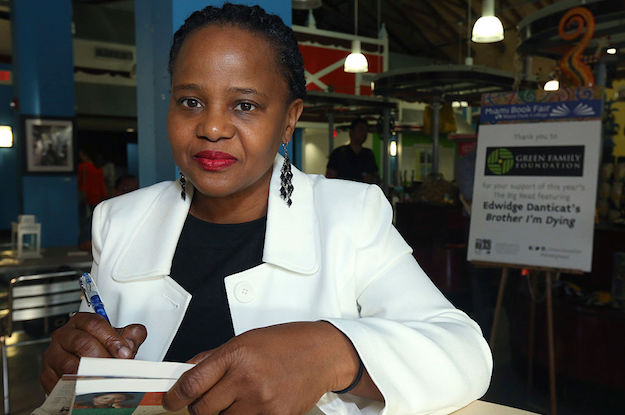This article is adapted from AQ’s most recent print issue | See the rest of our Top 5 Latin American Storytellers | Leer en español
When Edwidge Danticat was 12, she left her aunt and uncle’s home in Port-au-Prince, Haiti, and joined her immigrant parents in Brooklyn. It was 1981, and her welcoming gift was a fitting one for the girl who would become an award-winning author: a black Smith-Corona typewriter.
In Haiti, Danticat had listened in wonder as the stern, hardworking adults in her life transformed into an ensemble of dynamic storytellers, incorporating songs and folklore into candlelit performances on nights when the electric grid would fail. “From the time I was very young, I thought stories were magical,” Danticat, now 49, told AQ by phone from her home in Miami’s Little Haiti neighborhood.
Though her parents hoped she would become a brain surgeon, Danticat reckons the typewriter symbolized quiet approval of the literary dreams she had already begun to foster.
At 25, Danticat published her first novel, Breath, Eyes, Memory, which would become an Oprah Winfrey book club selection and lead to a garlanded career as a writer and advocate for Haitian immigrants. Her stature in the “dyaspora,” as Haitians call it, means she is often called upon to perform a kind of translation between Haiti and the United States. The two countries’ history includes episodes such as the 1915-34 occupation by U.S. Marines and the Donald Trump administration’s recent decision to end temporary protected status for some 60,000 Haitians — not to mention the president’s insulting comments about the country.
In addition to four novels, Danticat has published numerous books for children and young adults, a memoir, short stories, countless essays — even a radio play in Haitian Creole. These efforts led to a MacArthur “Genius Grant” Fellowship in 2009, and the Neustadt International Prize for Literature in 2017. “I’m glad that when I started I didn’t give too much thought to these boundaries you’re not supposed to cross,” Danticat said. “If one is an artist, especially if you come from a society where there are so many constraints, the art is where you are most free.”
—
Iberico Lozada is a graduate student in English and creative writing at Temple University



